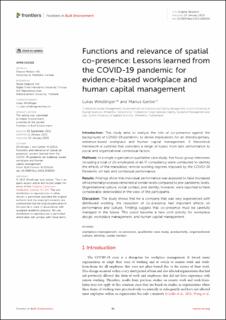Bitte benutzen Sie diese Kennung, um auf die Ressource zu verweisen:
https://doi.org/10.21256/zhaw-26767| Publikationstyp: | Beitrag in wissenschaftlicher Zeitschrift |
| Art der Begutachtung: | Peer review (Publikation) |
| Titel: | Functions and relevance of spatial co-presence : lessons learned from the COVID-19 pandemic for evidence-based workplace and human capital management |
| Autor/-in: | Windlinger, Lukas Gerber, Marius |
| et. al: | No |
| DOI: | 10.3389/fbuil.2023.1035154 10.21256/zhaw-26767 |
| Erschienen in: | Frontiers in Built Environment |
| Band(Heft): | 9 |
| Heft: | 1035154 |
| Erscheinungsdatum: | Jan-2023 |
| Verlag / Hrsg. Institution: | Frontiers Research Foundation |
| ISSN: | 2297-3362 |
| Sprache: | Englisch |
| Schlagwörter: | Workplace management; Co-presence; Qualitative case study; Productivity; Organisational culture; Identity; Social contact |
| Fachgebiet (DDC): | 658.3: Personalmanagement |
| Zusammenfassung: | Introduction: This study aims to analyze the role of co-presence against the background of COVID-19 pandemic to derive implications for an interdisciplinary, evidence-based workplace and human capital management. A theoretical framework is outlined that considers a range of topics from task performance to social and organizational contextual factors. Methods: In a single organization qualitative case study, five focus group interviews including a total of 20 employees of an IT consultancy were conducted to identify the effects of the mandatory remote working regimes imposed by the COVID-19 Pandemic on task and contextual performance. Results: Findings show that individual performance was assessed to have increased while internal processes remained at similar levels compared to pre-pandemic levels. Organizational culture, social contact, and identity, however, were reported to have considerably deteriorated in the view of the participants. Discussion: The study shows that for a company that was very experienced with distributed working, the reduction of co-presence had important effects on performance and culture. Findings suggest that co-presence must be carefully managed in the future. This could become a new joint priority for workplace design, workplace management, and human capital management. |
| URI: | https://digitalcollection.zhaw.ch/handle/11475/26767 |
| Volltext Version: | Publizierte Version |
| Lizenz (gemäss Verlagsvertrag): | CC BY 4.0: Namensnennung 4.0 International |
| Departement: | Life Sciences und Facility Management School of Management and Law |
| Organisationseinheit: | Institut für Facility Management (IFM) Institute for Organizational Viability (IOV) |
| Enthalten in den Sammlungen: | Publikationen Life Sciences und Facility Management Publikationen School of Management and Law |
Dateien zu dieser Ressource:
| Datei | Beschreibung | Größe | Format | |
|---|---|---|---|---|
| 2023_Windlinger-Gerber_Spatial-co-presence-leasons-learned-COVID19.pdf | 783.8 kB | Adobe PDF |  Öffnen/Anzeigen |
Zur Langanzeige
Windlinger, L., & Gerber, M. (2023). Functions and relevance of spatial co-presence : lessons learned from the COVID-19 pandemic for evidence-based workplace and human capital management. Frontiers in Built Environment, 9(1035154). https://doi.org/10.3389/fbuil.2023.1035154
Windlinger, L. and Gerber, M. (2023) ‘Functions and relevance of spatial co-presence : lessons learned from the COVID-19 pandemic for evidence-based workplace and human capital management’, Frontiers in Built Environment, 9(1035154). Available at: https://doi.org/10.3389/fbuil.2023.1035154.
L. Windlinger and M. Gerber, “Functions and relevance of spatial co-presence : lessons learned from the COVID-19 pandemic for evidence-based workplace and human capital management,” Frontiers in Built Environment, vol. 9, no. 1035154, Jan. 2023, doi: 10.3389/fbuil.2023.1035154.
WINDLINGER, Lukas und Marius GERBER, 2023. Functions and relevance of spatial co-presence : lessons learned from the COVID-19 pandemic for evidence-based workplace and human capital management. Frontiers in Built Environment. Januar 2023. Bd. 9, Nr. 1035154. DOI 10.3389/fbuil.2023.1035154
Windlinger, Lukas, and Marius Gerber. 2023. “Functions and Relevance of Spatial Co-Presence : Lessons Learned from the COVID-19 Pandemic for Evidence-Based Workplace and Human Capital Management.” Frontiers in Built Environment 9 (1035154). https://doi.org/10.3389/fbuil.2023.1035154.
Windlinger, Lukas, and Marius Gerber. “Functions and Relevance of Spatial Co-Presence : Lessons Learned from the COVID-19 Pandemic for Evidence-Based Workplace and Human Capital Management.” Frontiers in Built Environment, vol. 9, no. 1035154, Jan. 2023, https://doi.org/10.3389/fbuil.2023.1035154.
Alle Ressourcen in diesem Repository sind urheberrechtlich geschützt, soweit nicht anderweitig angezeigt.